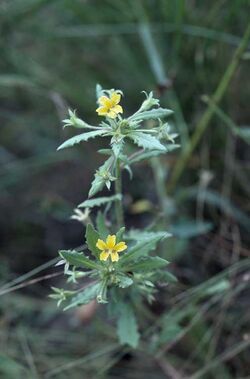Biology:Goodenia neglecta
| Goodenia neglecta | |
|---|---|

| |
| At Black Jungle Conservation Reserve | |
| Scientific classification | |
| Kingdom: | Plantae |
| Clade: | Tracheophytes |
| Clade: | Angiosperms |
| Clade: | Eudicots |
| Clade: | Asterids |
| Order: | Asterales |
| Family: | Goodeniaceae |
| Genus: | Goodenia |
| Species: | G. neglecta
|
| Binomial name | |
| Goodenia neglecta (Carolin) Carolin[1]
| |
| Synonyms[1] | |
|
Calogyne neglecta Carolin | |
Goodenia neglecta is a species of flowering plant in the family Goodeniaceae and is endemic to the Northern Territory of Australia. It is an ascending, weak-stemmed herb with toothed, egg-shaped leaves and racemes of yellow flowers.
Description
Goodenia neglecta is an ascending, weak-stemmed herb that typically grows to a height of up to 30 cm (12 in). It has egg-shaped leaves with the narrower end towards the base, leaves at the base of the plant, 15–60 mm (0.59–2.36 in) long and 3–20 mm (0.12–0.79 in) wide with teeth on the edges. Leaves on the stem are similar but decrease in size up the stem. The flowers are arranged in racemes up to 250 mm (9.8 in) long with leaf-like bracts, each flower on a pedicel 2–3 mm (0.079–0.118 in) long. The sepals are oblong to elliptic, about 3 mm (0.12 in) long, the corolla yellow, 10–15 mm (0.39–0.59 in) long. The lower lobes of the corolla are 4–5 mm (0.16–0.20 in) long with wings about 1 mm (0.039 in) wide. Flowering mainly occurs from February to April and the fruit is a more or less spherical capsule about 3 mm (0.12 in) in diameter.[2][3]
Taxonomy and naming
The species was first formally described in 1979 by Roger Charles Carolin who gave it the name Calogyne neglecta in the journal Brunonia from specimens he collected on Mudgenbury Station in 1968.[4] In 1990, Carolin changed the name to Goodenia neglecta in the journal Telopea.[5][6]
Distribution and habitat
This goodenia grows in damp places in woodland in Arnhem Land.[2][3]
Conservation status
Goodenia neglecta is classified as "least concern" under the Northern Territory Government Territory Parks and Wildlife Conservation Act 1976.[3]
References
- ↑ 1.0 1.1 "Goodenia neglecta". Australian Plant Census. https://biodiversity.org.au/nsl/services/apc-format/display/118503.
- ↑ 2.0 2.1 Carolin, Roger C.. "Goodenia neglecta". Australian Biological Resources Study, Department of Agriculture, Water and the Environment: Canberra. https://profiles.ala.org.au/opus/foa/profile/Goodenia%20neglecta.
- ↑ 3.0 3.1 3.2 "Goodenia neglecta". Northern Territory Government. http://eflora.nt.gov.au/factsheet?id=2658.
- ↑ "Calogyne neglecta". APNI. http://id.biodiversity.org.au/instance/apni/525763.
- ↑ "Goodenia neglecta". APNI. http://id.biodiversity.org.au/instance/apni/552741.
- ↑ Carolin, Roger C. (1990). "Nomenclatural notes and new taxa in the genus Goodenia (Goodeniaceae)". Telopea 3 (4): 558–559. doi:10.7751/telopea19904905. https://www.biodiversitylibrary.org/item/265128#page/119/mode/1up. Retrieved 14 March 2021.
Wikidata ☰ Q17480088 entry
 |

